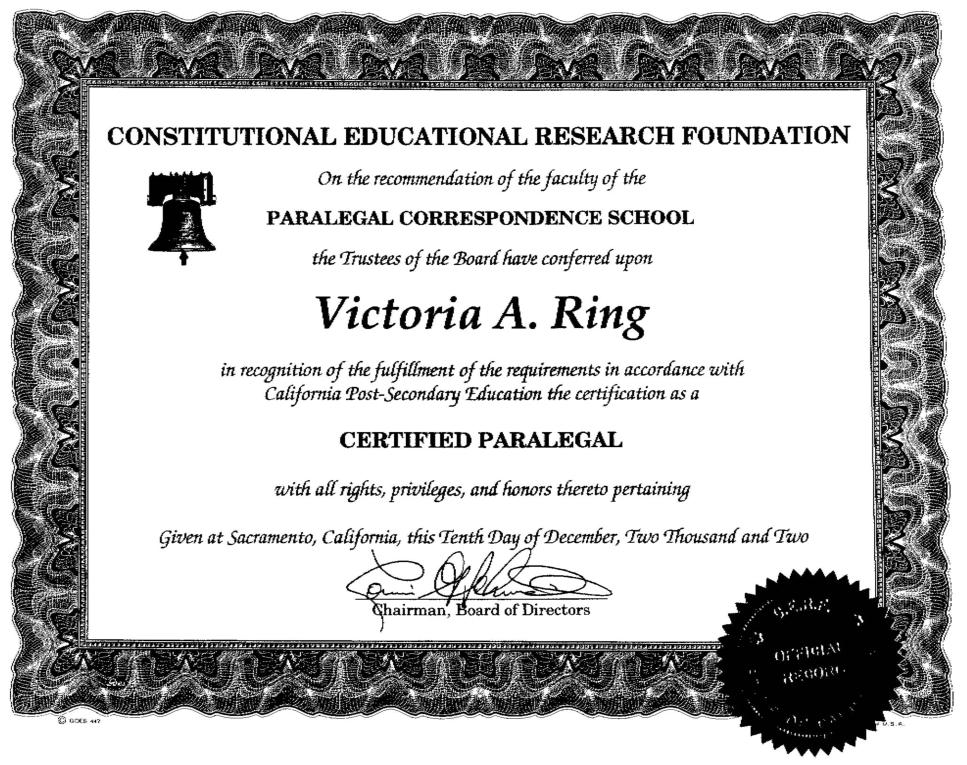Certified Paralegal (CP) or Certified Legal Assistant (CLA) is the title of paralegals in the United States who have passed the Certified Paralegal Exam and have met additional education and experience requirements for certification as a CP or CLA. In the United States "paralegal" and "legal assistant" are frequently used interchangeably.
The primary function of paralegals is to assist attorneys in the delivery of legal services. According to the American Bar Association: “A legal assistant or paralegal is a person, qualified by education, training or work experience who is employed or retained by a lawyer, law office, corporation, governmental agency or other entity and who performs specifically delegated substantive legal work for which a lawyer is responsible.â€
To become a Certified Paralegal in the United States, the candidate voluntarily passes the Certified Paralegal Exam (CP Exam). The Certified Paralegal program established in 1976 is administered by the National Association of Legal Assistants (NALA). The CP designation is a certification duly registered with the U.S. Patent and Trademark Office (No. 78213275)
According to the American Bar Association, there is a distinction between "certified" paralegals and "certificated" paralegals and the terms are not interchangeable. Certified Paralegals have passed a professional exam and certificated paralegals have completed a paralegal program or other preparatory education through an academic institution. Certificated paralegals are generally eligible to take the CP Exam after graduating from an approved paralegal program.
Because certification programs are voluntary in most states, a paralegal may find work in the field without obtaining certification. Requirements may vary by state.
Eligibility

To be eligible to take the Certified Paralegal Exam, an application must have graduated from a paralegal program (a) Approved by the American Bar Association; or (b) An associate degree program; or (c) A post-baccalaureate certificate program in paralegal studies; or (d) A bachelor's degree program in paralegal studies; or (e) A paralegal program which consists of a minimum of 60 semester hours (900 clock hours or 90 quarter hours) of which at least 15 semester hours (225 clock hours or 22.5 quarter hours) are substantive legal courses. There are also other categories under which an applicant may be eligible to take the Certified Paralegal Exam.
Certified Paralegal Exam

The Certified Paralegal Exam (CP Exam) is given in January, May and September each year. Beginning in September, 2013 the CP Exam tests applicants on Communications, Ethics, Legal Research, Judgment, Analytical Ability, and Substantive Law (including the American Legal System, Civil Litigation, Contracts, and Business Organizations).
According to Legal Assistant Today magazine, the CP Exam has a 45-50% pass rate.
The CP Exam is a national exam. However, it is important to note that the State Bars of Florida, North Carolina, Ohio and Texas have their own paralegal certification programs. Although California does not certify paralegals in general, California legislation (AB 1761) makes it unlawful for persons to identify themselves as paralegals unless they meet certain requirements. Paralegals must also complete continuing legal education every two years in order to lawfully perform services or identify as a paralegal.
Ethics

NALA requires applicants for CP status to complete a special examination on ethics to become a CP. The CP exam requires knowledge of the American Bar Association's Model Rules of Professional Conduct and the NALA Code of Ethics and Professional Responsibility.
Continuing Legal Education (CLE)

CPs are required to take continuing legal education courses in order to renew their certification. As part of the CLE requirement, CPs must also incorporate ethics courses during every renewal period. The CP credential will be revoked from all Certified Paralegals failing to meet the recertification requirements after a period of probation. The paralegal must then retake the CP examination to use the credential again.
Advanced Certified Paralegal (ACP)
After a paralegal obtains the CP credential, he or she is eligible to participate in the Advanced Paralegal Certification program. The credential awarded after successful completion of the program is the "ACP" credential. A CP must complete an ACP course and pass an exam which demonstrates advanced knowledge in the specific practice area or areas of practice in which the course is taken
Background and Numbers
According to NALA, as of March 15, 2013, there are 17,410 Certified Paralegals and as of April 2, 2013 there are 2,943 Advanced Certified Paralegals in the United States. More than 25,000 paralegals have participated in this program.
Other Paralegal Certification Programs
The National Federation of Paralegal Associations, or NFPA, offers two certification programs. Their Paralegal Advanced Competency Exam (PACE®) was established in 1996. Their Paralegal CORE Competency Exam (PCCE™) was established in 2011. A paralegal who completes the certification process through the NFPA earns the credential Registered Paralegal (RP) for completion of the PACE Exam and Core Registered Paralegal (CRP) for completion of the PCCE Exam.
The Association for Legal Professionals, or NALS, previously National Association of Legal Secretaries, offers the Professional Paralegal Exam established in 2004. A paralegal who completes the certification process through NALS earns the credential Professional Paralegal (PP).
References
External links
- nala.org

Paralegals in Miami or NYC?
ReplyDeleteparalegal school miami
I don't know what to say except that I have enjoyed reading. Nice blog. I will keep visiting this blog very often.
ReplyDeletego back to school